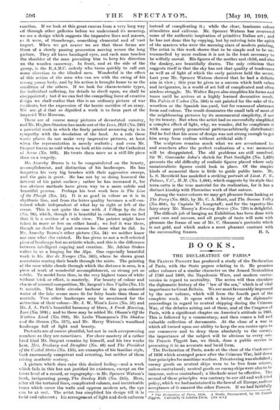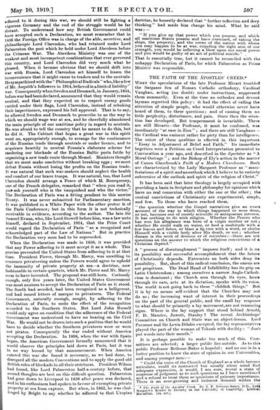BOOKS.
THE DECLARATION OF PARIS.* Sin Fusxms Prcoorr has produced a study of the Declaration of Paris, with the State papers relating to it. He promises other volumes of a similar character on the Armed Neutralities of 1780 and 1800, the Napoleonic Wars, and modern contro- versies in regard to neutrality. The series. will thus elucidate the diplomatic history of the " law of the sea," which is of vital importance to Great Britain. We are most favourably impressed by the new volume, which will form the fourth part of the complete work. It opens with a history of the diplomatic proceedings in regard to neutral shipping during the Crimean War, of the debates arising out of these, and of the Congress of Paris, with a significant chapter on America's attitude in 1861. This is followed by a commentary, and then comes a full and valuable collection of documents. At the close of a war in which all turned upon our ability to keep the sea-routes open to our commerce and to deny them absolutely to the enemy, the importance of the subject will be obvious to every one. Sir Francis Piggott has, we think, done a public service la presenting it in an accurate and lucid form. The Declaration of Paris, made at the close of the Conference of 1856 which arranged peace after the Crimean War, laid down four principles for maritime warfare. Privateering was abolished ; enemy goods on neutral ships were to be free from seizure, unless contraband; neutral goods on enemy ships were also to he immune, unless contraband; a blockade must be effective. The second of these principles was contrary to our old and well-tried policy, which we had maintained in the face of all Europe, and our acceptance of it amazed the other Powers. If we had faithfully
lug* gr. Da:1671,11g fL358.tui;11.:1Documented, by Sir Fraud' Lesion mesa adhered to it during this war, we should still be fighting a vigorous Germany and the end of the struggle would be far distant. To understand how any British Government could have accepted such a Declaration, we must remember that in 1856 the Foreign Office was in charge of the able, secretive, and philanthropic Lord Clarendon, who had retained under Lord Palmerston the post which he held under Lord Aberdeen before the Crimean War. The Aberdeen Ministry was one of the weakest and most incompetent combinations that ever governed this country, and Lord Clarendon did very much what he pleased. When it became obvious that we should drift into war with Russia, Lord Clarendon set himself to lessen the inconvenience that it might cause to traders and to the neutrals. He sympathized with the" Philosophical Radicals" who, like a few of Mr. Asquith's followers in 1914, believed in alimited liability" war. Consequently when Sweden and Denmark, in January, 1854, before war had been declared, announced that they would remain neutral, and that they expected us to respect enemy goods carried under their flags, Lord Clarendon, instead of rebuking their impertinence, expressed his full approval. That is to say, he allowed Sweden and Denmark to prescribe to us the way in which we should wage war at sea, and he cheerfully abandoned the main principle of our maritime policy in regard to neutrals. He was afraid to tell the country that he meant to do this, but he did it. The Cabinet that began a great war in this spirit went on, appropriately enough, to arrange for the continuance of the Russian trade through neutrals or under licence, and to acquiesce heartily in neutral Prussia's elaborate scheme for rendering our blockade of the Russian Baltic ports futile by organizing a new trade route through Memel. Ministers thought that we must make omelettes without breaking eggs ; we must defeat Ramie without losing the profits on the Russian trade. It was natural that such war-makers should neglect the health and comfort of our brave troops. It was natural, too, that Lord Clarendon should arrange a Peace of which M. Bourqueney, one of the French delegates, remarked that ." when you read it, you ask yourself who is the vanquished and who the victor." The Declaration of Paris was a fitting pendant to this unwise Treaty. It was never submitted for Parliamentary sanction. It was published in a White Paper with the other protoc Is of the Paris Conference; but in this form it is not technically receivable in evidence, according to the author. The late Sir Samuel Evans, who, like Lord Stowell before him, was a law unto himself, declared in September, 1914, that the Prize Court would regard the Declaration of Paris " as a recognized and acknowledged part of the Law of Nations." But in practice the Declaration very soon had to be superseded.
When the Declaration was made in 1856, it was provided that any Power adhering to it must accept it as a whole. This proviso prevented the United States from adhering to it at that time. President Pierce, through Mr. Marcy, was unwilling to renounce privatcering unless the Powers would agree to uphold the immunity of private property at sea—a doctrine, now fashionable in certain quarters, which Mr. Pierce and Mr. Marcy seem to have invented. The proposal was still-born. Curiously enough, only five years later, the United States Government was most anxious to accept the Declaration of Paris as it stood. The South had seceded, had been recognized as a belligerent, and had issued letters of marque to privateers. The Federal Government, naturally enough, sought, by adhering to the Declaration of Paris, to undo the effect of the recognition accorded to the Southern States. But Lord John Russell would only agree on condition that the adherence of the Federal Government was understood to have no bearing on the Civil War. He would not be drawn into such a position that he would have to decide whether the Southern privateers were or were not pirates. Consequently de. war ended without America accepting the Declaration. In 1898, when the war with Spain began, the American Government formally announced that it would observe the principles laid down at Paris, but it was in no way bound by that announcement. When America entered this war she found it necessary, as we had done, to disregard all the modern Conventions and to apply the good old British rules of blockade in all their strictness. President Wilson had found, like Lord Palmerston half-a-century before, that second thoughts are best on this difficult question. Palmerston had gone down to Liverpool in 1856 after peace was declared, and in his enthusiasm had spoken in favour of exempting private Property at sea from capture. But when, in 1862, he was chal- lenged by Bright to say whether he adhered to that Utopian
doctrine, he honestly declared that "further reflection and deep thinking" had made him change his mind. What he said was :— " If you give up that power which you possess, and which all maritime States possess and have exercised, of taking the ships, the property, and the crews of the nation with whom you may happen to be at war, crippling the right arm of our strength, you would be inflicting a blow upon our naval power and you would be guilty of an act of political suicide." .
That is essentially true, but it cannot be reconciled with the unhappy Declaration of Paris, for which Palmerston as Prime Minister was responsible.







































 Previous page
Previous page